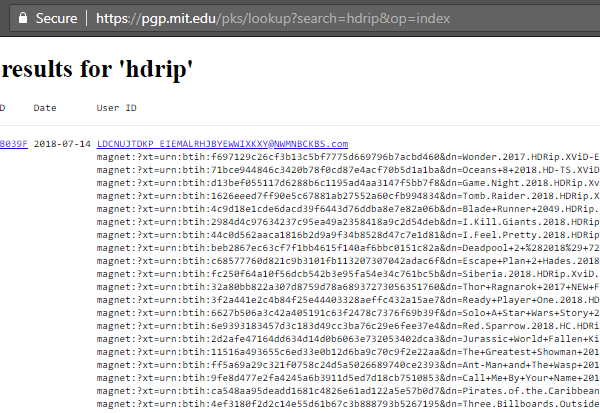Italy Wants to Upgrade Movie “Camming” Piracy to a Criminal Offense
samedi 8 septembre 2018 à 10:27 When the vast majority of movies are released to the public, viewings take place exclusively in cinemas. The industry is extremely protective of this initial window, which is seen as both lucrative and protective of the theater industry.
When the vast majority of movies are released to the public, viewings take place exclusively in cinemas. The industry is extremely protective of this initial window, which is seen as both lucrative and protective of the theater industry.
This strict and exclusive window also causes problems, however. While huge marketing budgets are mostly successful in luring large numbers of people to the big screen, millions sit at home waiting for a cable, DVD, or VOD release. Or, alternatively, a pirate copy to appear either online or through physical piracy channels.
These illicit copies are obtained by people taking camcorders or similar devices into cinemas and recording the screen. Quality is notoriously suspect but for large numbers of impatient movie fans, a ‘cammed’ copy with blurry video and unwanted audio interruptions is still desirable.
Some countries have legislation to deal with the problem. In the US, for example, ‘camming’ is a serious offense, one that can see offenders hauled off to prison. In other regions, however, the activity isn’t viewed so seriously, something which movie companies are keen to change.
In Italy, ‘camming’ is currently considered an administrative wrongdoing, i.e something which is technically wrong to be handled in ways other than prison. It’s a position the movie industry hopes will change if new legislation under consideration is placed on the books.
According to an Adnkronos report, a new bill has just been presented by the Forza Italia party which proposes upgrading the offense significantly.
The proposal, signed by Member of Parliament Marzia Ferraioli, would transform camcording from a “mere administrative wrongdoing” to a “criminal offense punishable like other illegal acts of piracy.”
“The law proposal by Mrs. Ferraioli, whom we thank for the attention given to the issue of piracy, represents an important signal at a time, like the current one, in which the protection of audiovisual works is severely tested,” Federico Bagnoli Rossi of anti-piracy group FAPAV told Key4Biz.
“Specifically, the problem of camcording has often been underestimated or considered to be in decline but it still represents the apex of the illicit supply chain of pirated content.
“This aspect is also aggravated by the fact that these recordings are made in the very first days of the presence of films in cinemas, when the works are in their initial phase of exploitation, creating significant economic damage to the exhibitors and to the entire audiovisual industry,” Rossi said.
In common with opponents of camming around the world, Italian authorities believe that illegally-recorded first-run titles not only undermine the investment made in films and the livelihoods of those who make them, but also serve as a profit center for criminals involved in other crime.
“The profits of the illegal activity of camcording finances criminal organizations, they create huge damage to the entire chain of film, and undermine the work of the workers and professionals involved in making a film,” the legislative proposals read.
To combat the threat, it’s also envisioned that cinema owners will be able to install video surveillance systems to “monitor the introduction, installation or other abusive use of devices with camcorder functionality.”
A report published by FAPAV in July, which revealed a two percent fall in piracy overall, stated that dealing with illicit camcording was one of the anti-piracy group’s most pressing goals.
“Our priorities, at the moment, are represented by a tightening of the regulation that regulates camcording, that is the illicit video or audio recording of a film in the theater, and overcoming the problems arising from those services that hide the real owners of the websites and hosting providers that host them,” FAPAV wrote.
Source: TF, for the latest info on copyright, file-sharing, torrent sites and more. We also have VPN reviews, discounts, offers and coupons.
 BitTorrent is often praised for its decentralized nature. The file-transfers take place between users and there’s no central service required.
BitTorrent is often praised for its decentralized nature. The file-transfers take place between users and there’s no central service required. 
 Over the past several years, dozens of streaming sites have sprung up to service users looking for a torrent-style fix, without having to deal with the relative complications of torrent sites.
Over the past several years, dozens of streaming sites have sprung up to service users looking for a torrent-style fix, without having to deal with the relative complications of torrent sites.
 The Netherlands has long been a relaive safe haven for pirating consumers.
The Netherlands has long been a relaive safe haven for pirating consumers. 